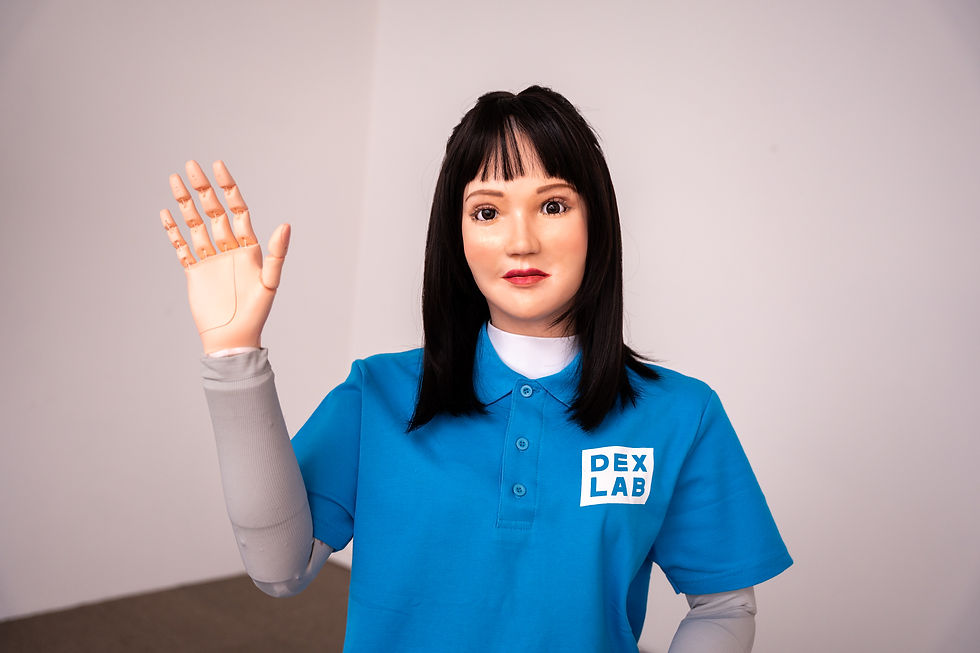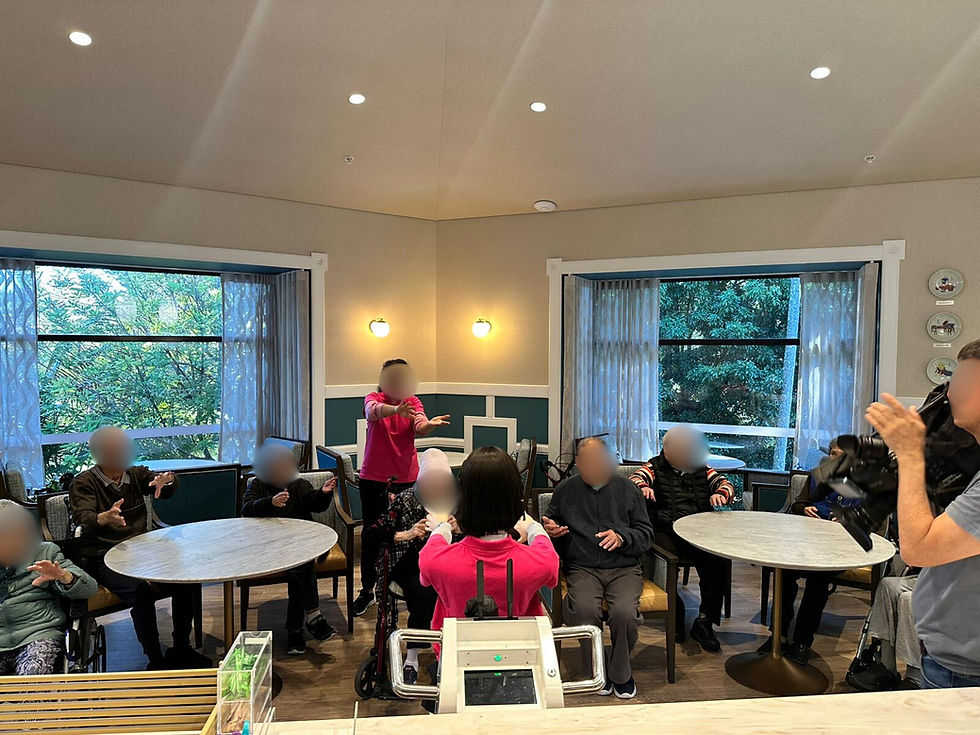How Social Robots Have Changed Elder Care for the Better
- Benjamin Lee
- Nov 22, 2023
- 5 min read

Image credit: rawpixel.com on freepik
In today's rapidly evolving healthcare landscape, social robots are emerging as indispensable allies. These robots are not just machines but compassionate companions tailored to address the diverse needs of patients, particularly the elderly and those with cognitive impairments.
Social robots are reshaping the eldercare landscape, offering dynamic solutions to age-old challenges. By effortlessly bridging communication barriers, they ensure that seniors feel heard and understood.
Additionally, their capability to provide consistent therapeutic activities fosters cognitive and emotional well-being in older adults.
In the section below, we'll look at how social robots are changing elderly care for the better.
The Role of Social Robots in Elder Care
1. Overcoming Communication Challenges
The intrinsic link between language and culture becomes crucial in elder care. When seniors revert to their native tongues, caregivers need to respond appropriately.
Doing so makes it easier for those under their care to effectively express their anxiety, fear, discomfort, or happiness, which in turn facilitates better healthcare outcomes.
Take, for instance, the story of Mrs. Li, a resident at an elder care centre. One evening, feeling overwhelmed and unwell in the unfamiliar environment, Mrs. Li became distressed when she found herself struggling to communicate in English. In her agitation, she resorted to speaking in Mandarin, expressing her discomfort and anxiety.
In the traditional caregiving setting of the centre, her Mandarin words were met with puzzled looks from the caregivers. They struggled to understand her, interpreting her anxiety as mere restlessness. Over time, the caregivers' inability to comprehend her language led to signs of impatience, which only added to Mrs. Li's frustration and disappointment.
However, the situation took a turn for the better with the introduction of Dexie, a social robot programmed to understand Mandarin. When the caregivers brought Dexie to her, it immediately picked up on Mrs. Li's words.
Unlike the caregivers, Dexie never showed impatience. It responded to Mrs. Li's needs consistently, even when she expressed herself in ways that could be construed as rude due to her distress.
The persistence and understanding shown by Dexie brought a sense of relief to Mrs. Li. She found the robot's unflagging patience and its attempts to communicate in Mandarin amusing. Eventually, the interactions with Dexie lightened her mood, leading her to burst out laughing, a moment of joy amidst her struggles.
Tools like Dexie allow caregivers to bridge the communication gap, ensuring that residents like Mrs. Li are not only heard but also understood. It demonstrates how integrating technology into caregiving can transform the quality of care, making it more responsive and empathetic to the diverse needs of the elderly.
2. Enhancing Mental Well-being Through Responsive Interaction
According to the Alzheimer's Society, individuals with dementia will undergo changes in their emotional responses. This can result in a loss of control over their emotions and increased difficulty in expressing themselves, which leads to isolation, frustration, and irritability.
Consequently, this puts a strain on carers and dementia patients themselves while further compounding any feelings of loneliness. Social robots have a valuable role to play in such situations through the following:
Keeping Patients Entertained
Social interactions play a crucial role in the well-being of patients with dementia. These interactions help maintain cognitive functions and emotional health, offering a sense of connection and normalcy.
Engaging regularly with others can significantly improve the quality of life for dementia patients, helping to alleviate feelings of isolation and confusion that often accompany the condition.
For example, take the story of Mr. Tan, a jovial and sociable resident at a senior living facility. Mr. Tan enjoys interaction and engagement but often finds himself feeling lonely and under-stimulated, especially during times when the caregivers are busy attending to other residents.
Fortunately, Dexie, a versatile social robot, can help keep Mr Tan engaged and entertained by:
Engaging them in chit chat sessions — Dexie can keep patients company by speaking to them in Mandarin and English.
Getting patients to join in on sing along sessions — With a diverse repertoire of songs in English, Mandarin, and Malay, Dexie engages patients, catering to their musical preferences and significantly enhancing their mood.
Taking patients through exercise routines — Dexie’s program includes leading patients in tailored exercise routines, promoting physical health and mental well-being through gentle, guided movements.
Hosting group-based games — Dexie fosters social interaction and mental engagement by hosting group-based games, creating a fun and interactive environment for patients to connect and stimulate their minds.
Consistent and Judgement-Free Interaction
Human caregivers, despite their best intentions, might occasionally experience fatigue or moments of impatience, which can be perceived by the dementia patient, further aggravating their emotional turmoil.
Social robots, on the other hand, offer consistent, judgement-free interactions. Their unwavering patience and calm demeanour can be particularly reassuring for dementia patients, ensuring they always have a reliable, comforting entity to interact with.
3. Providing Musical Therapy for Patients
For several decades now, music has been successfully used in therapy for dementia patients. According to experts, the benefits include better brain function and improvement in cognitive areas.
The intricacies of the human brain reveal that the regions associated with musical memories often remain untouched, even as dementia progresses. This means that melodies and rhythms from a patient's past can spark recollections and activate areas of the brain that are otherwise difficult to reach.
As part of its Dementia Care Program, Dexie can play various songs for patients under its care to sing along to. By encouraging patients to sing along, Dexie stimulates vocal and cognitive faculties. This active engagement with music can be particularly therapeutic, eliciting positive emotions, reducing agitation, and offering a sense of accomplishment.
4. Engaging Dementia Patients with Group Activities
While individual care is essential, the value of community interactions can't be overstated. Social robots are pioneering this front by introducing group-based games. By actively engaging patients in activities like Bingo, they stimulate cognitive functions and promote social interactions.
There are many benefits to taking a communal approach to patient care including:
Combating Isolation
Dementia can often become an isolating experience. Patients might retreat into themselves, both because of the internal confusion caused by the disease and the external difficulty in communication.
Community interactions fostered by group activities provide a touchpoint to the outside world, alleviating loneliness and isolation. Through these interactions, patients find validation, companionship, and understanding.
Boosting Cognitive Stimulation
Group-based games like Bingo aren't just for fun. They engage multiple cognitive faculties – from memory recall of numbers and patterns to the motor skills required to mark the cards. Being in a group setting can also introduce an element of healthy competition, motivating patients to focus more and participate actively.
Encouraging Social Skills
Participating in group activities can help maintain or even improve social skills. It necessitates communication, patience, and collaboration – all of which can be therapeutic for dementia patients. Regular social interaction also allows them to practise and retain their conversational skills.
Enhancing Emotional Well-being
The joy of shared laughter, the camaraderie in a group win, or even the shared anticipation in games are all moments that uplift spirits. These shared experiences can instil a sense of belonging and purpose, vital for emotional well-being.
Closing Thoughts
The advent of social robots like Dexie marks a significant milestone in the evolution of eldercare. By transcending traditional caregiving boundaries, these robots serve as compassionate companions, offering much more than mere technological interaction.
They provide a bridge for communication, enhance mental well-being through responsive and consistent interactions, and introduce therapeutic activities like music and group games. Dexie’s capabilities in overcoming language barriers, keeping dementia patients engaged, and offering judgement-free companionship exemplify a forward-thinking approach in eldercare.
This innovative leap is not just about meeting the current needs of the elderly, particularly those with dementia. It's about shaping a future where technology seamlessly integrates with human-centric care, fostering environments that are nurturing, inclusive, and deeply empathetic.
For a closer look at how Dex-Lab and Dexie are revolutionising eldercare, visit our website here.



Comments